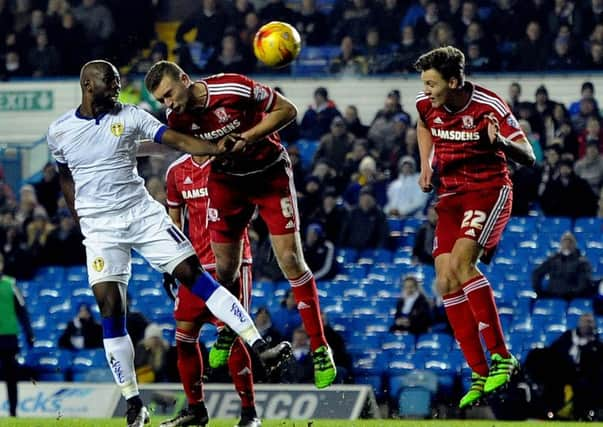Leeds United: No party comes out with credit from TV debate '“ Hay


Some involved might protest their innocence but the legal process in which Leeds challenged Sky’s deal with the Football League shines a positive light on none of the protagonists. It paints United and Cellino as confused complainants, unclear about what it is that they want. It paints the Football League as a body which has given Sky carte blanche to do as they will with live broadcasts. And it paints Sky as an ambivalent bystander, quiet in the background as Leeds and the Football League get on with their argument.
For now the League has won its case and it will hold that position indefinitely unless Cellino changes tact. The arbitration ruling which Leeds asked for in December – brought on by Sky’s attempt to move this week’s game against Middlesbrough – was forthright in dismissing every aspect of United’s opposition to that rearrangement and the broadcast contract in general. The legalities are in the League’s favour which proves again why Leeds should be fighting this case from a moral standpoint.
Advertisement
Hide AdAdvertisement
Hide AdOn that basis the club will find sympathetic ears around them, not only from their own crowd but from other teams in the Championship. What United and Cellino cannot do is portray this as a fight for the rights of supporters – as Cellino did in a programme column on Monday night, saying it was “with their interests in mind that we push for change” – while misleading them about the exact nature of their complaint.
Leeds’ executive director Paul Bell, who attended and spoke on Cellino’s behalf at a Football League meeting in Milton Keynes last week, said on Sunday that Leeds were “not seeking to dismantle the collective selling of TV rights.” The findings of the arbitration panel dispute that comment, saying explicitly that among other things Leeds wanted “the right to market and sell broadcast rights to their matches.” At best the club’s statement downplayed the significance of that part of the dispute, or leant on the fact that their complaint has been withdrawn. At worst it was wilfully inaccurate. A contradiction so plain weakens their credibility, particularly when Cellino is quoted as saying that this is about “fans who feel the effect financially and emotionally.”
The same will be said of Leeds’ refusal to accept a 12.30pm Saturday kick-off time against Middlesbrough – an offer made by the Football League four days after the club first rejected the option of a switch to a Monday night – but that scenario should be seen in context.
United did reject that proposal but they did so in early December, believing they could stand their ground and enforce the original 3pm start through legal action. It was the rearrangement for television per se, rather than the choice of time slot, which Leeds chose to fight over.
Advertisement
Hide AdAdvertisement
Hide AdBy the time the arbitration panel delivered its ruling in late January, a Monday night date was all Sky had left. Cellino fought and lost, which is no consolation for fans from Norway, Ireland and elsewhere who saw travel costs burned in the midst of that process, but there was and is a groundswell of pressure for United to oppose excessive fixture disruption. They were entitled to take a stand; it is merely that between a short-lived cut in away tickets, the bluffed threat to ban Sky from December’s game against Derby County and the failure of Leeds’ legal case against the League, the club have achieved nothing at all.
Cellino likes the idea of clubs negotiating individual broadcast deals. He says as much openly, although to speak to him even he sounds unconvinced about the likelihood of collective contracts going by the wayside in England soon. That aspect of the arbitration claim looks particularly opportunistic and as the dust settles it becomes obvious that a lone voice howling in the wind will do little to change the hold that Sky has over the Championship. At the outset, Cellino needed a collective mindset. He needed a consensus, a group of like-minded owners to make the case on the only pertinent issue: namely the disproportionate changes which certain clubs and certain groups of supporters are asked to contend with. Brighton away at the end of this month is Leeds’ 13th televised appearance this season. It is really not difficult to argue that the alterations are excessive.
The Football League, in its wisdom, is not bowing to that viewpoint. The arbitration papers say that the governing body rejected outright Leeds’ request for an unredacted copy of Sky’s broadcast deal, insisting the contract was confidential. It seems extraordinary that clubs bound so tightly to a deal have no access to the fine details of it. The ruling also said that in the League’s view, Leeds did not have “any right to reject the selection” of the Boro match for live coverage, regardless of prior complaints. That lends weight to the feeling that Sky’s money – substantial amounts, it should be said – has bought them complete autonomy.
And for the fans who look on? A club who cannot get their story straight; a governing body which is apparently unsympathetic to the idea that 13 televised games in seven months is over the top; and a broadcast firm who have turned a deaf ear to criticism in these parts and carried on regardless. “Supporters are the lifeblood of any club,” said Steve Evans on Monday. Perhaps he could pass that message on.